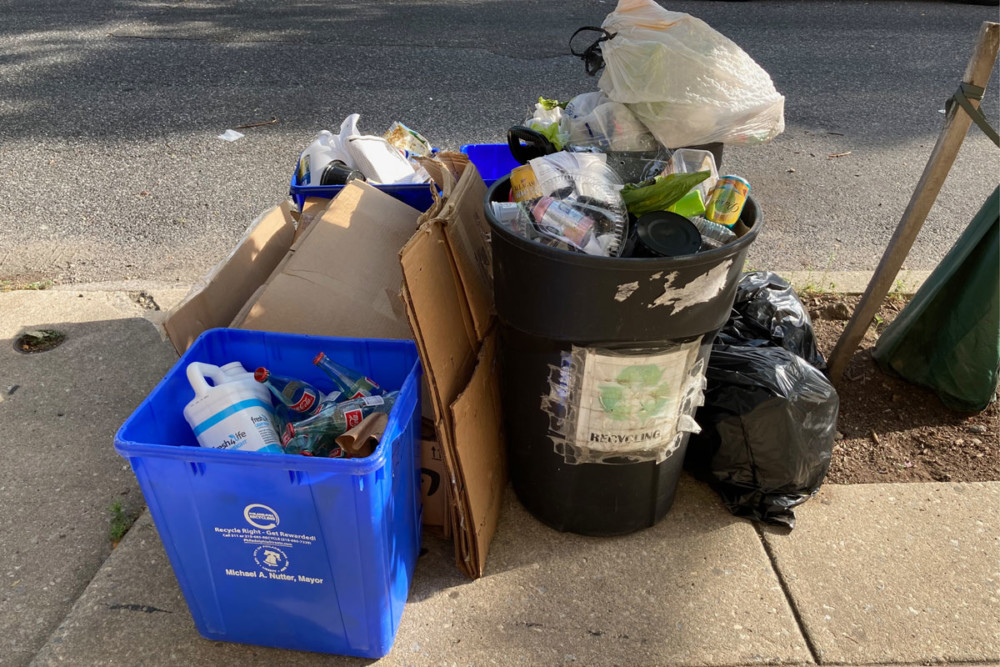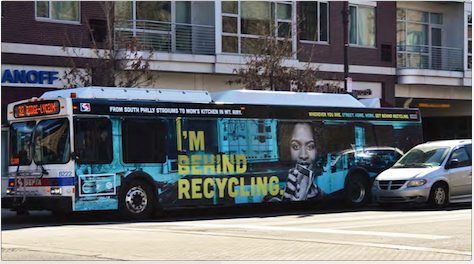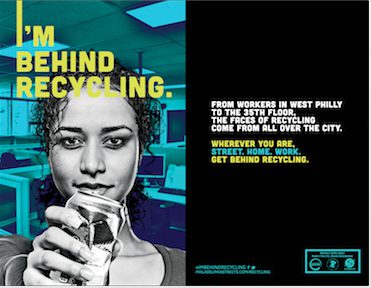
Recycling isn’t Happening Again. Is it the weather or pandemic? Instead, Insiders Blame Decades of a Mismanaged Streets Department
Between weeks of trash delays, reports of trash and recycling being combined into one truck, Mayor Kenney has blamed everything from residents’ DIY home projects to weather events.
However, experts who have worked in and alongside of Philadelphia’s Streets Department describe the City’s current issues as the culmination from years of mismanagement and bureaucratic missteps. Others note that despite holding public engagement meetings and internal meetings, Streets refuses to listen to any advice, including from inside City Government.
Recycling: An Outdated System
“The system has been broken for a long time.”
Maurice Sampson, Director, Clean Water Action
Eastern Pennsylvania Director of Clean Water Action, Maurice Sampson, was Philadelphia’s First Recycling Coordinator. Sampson notes that our modern trash collection is based on the first iteration, using horse-carts designed in 1949. “The last time they looked at how we collect trash and did a plan around it was 1949. Ever wonder why we have two lifters and a driver who doesn’t collect trash? Because you can’t drive a horse cart and collect trash.”
The driving routes haven’t had much innovation either.
Unlike modern vehicles, there is no GPS in Philadelphia trash trucks, instead of relying on paper to make routing decisions. The data-process used to update routes is extremely slow, taking weeks or months to react to changes. “There are GPS that track the trucks, but none inside of the trucks,” said an anonymous sanitation worker.
“Sanitation workers are assigned their routes based on paper spreadsheets on clipboards and maps that remain static,” explained Nicolas Esposito, who recently served as the Zero Waste and Litter Director for Philadelphia from 2016 to June 2020. Instead, modern collection routes could be greatly improved by “a smart-routing system where onboard GPS can be connected to real-time routing,” according to Esposito.
Sanitation workers don’t even have city-issued cell phones to report conditions back to the city.
Without real-time data and analytics, it’s nearly impossible to adapt to changes in waste patterns, like the current increase due to COVID.
“Trash tonnage has increased by 30%. So, we’re collecting on a weekly basis, an extra three or 4,000 tons a week. That’s equal to another day and a half of work, then you add into that a staffing shortage due in part to COVID.” Said Scott McGrath, Environmental Planning Director for the Philadelphia Streets Department.
There has been an inability to separate recycling from trash as the workload overwhelms the Street Department. McGrath explained “We’ve had to collect both together, just to catch up and everything. We’re working very hard right now to try to keep things separate but we’re not 100% there right now.”
McGrath’s statement contradicted Mayor Jim Kenney’s statement that sanitation workers combining trash and recycling were anecdotes.
A sanitation worker confirmed, “the last couple of months we’ve been taking trash and recycling at once just to get stuff up.”
Critics are upset that the city has not been transparent about when or the reason to comingle trash and recycling. Instead of telling residents to hold their recycling for every-other-week or designate neighborhoods to hold recycling, they combine the two without transparency.
Sam Wittchen, a consultant of iSpring and who advised the Streets Department from 2013 to 2018, explained, “Structural issues have existed for a long time. When you don’t plan for anything and you have a lack of staff, your house of cards will fall. We saw it happen with burning recyclables, now it’s the pandemic. What’s the next crisis going to be? They hop from crisis to crisis and there will be another one.”
** Update 9/22 1:25 PM: After this story published, the Streets Department announced a new PickupPHL tool for residents to track trash and recycling in real-time. We will report more soon.
Big Talk, No Follow Through
You appoint all of these policy people to look progressive but then don’t support them to get their plans done.”
Nic Esposito
According to city insiders, the Streets Department isn’t collaborative or accepts offers for help outside of their department.
According to Esposito’s insider’s critique of the Kenney administration, they have too many goals without devoting the proper amount of resources.
“They’re trying to do a million things at once. Emission zero plan, a zero-waste plan, a workforce development plan; they create all of these commissions and then give them no staff, resources, or political power. You appoint all of these policy people to look progressive but then don’t support them to get their plans done,” explained Esposito.
Take litter, a complex problem that touches every city agency. As Esposito explained, “A piece of litter ends up on the Street, then goes into the sewer and now it’s the Water Departments problem or it’s in a park. Now it’s Park and Rec’s problem.”
In 2016, Mayor Kenney established the Zero Waste and Litter Cabinet to commit Philadelphia to be “zero waste and litter free by 2035” and bridge gaps between the various city agencies. Yet, the Zero Waste and Litter Cabinet was one of the first to fall victim during sweeping COVID-19 layoffs, along with Esposito’s position.
“I don’t think it’s a coincidence that they got rid of a bunch of planning people, and then the sanitation system collapses,” he explains. Esposito warned the department of COVID’s impact on their systems as early as March, to no avail.
However, sanitation workers bore the brunt of issues, including lack of PPE and hazard pay caused by shoddy planning. According to the Sanitation Union Local 427, more than 100 sanitation workers have contracted COVID-19.
In response, the City’s sanitation workers protested in June. Some members of the workforce who attended protests in June were suspended.
“The problem is not the union or the workers, the problem is management,” says Sampson. “The system has not changed; the Streets Department decides what happens, and everyone else follows. No Mayor is going to challenge the waste system and risk a strike. Mayors are terrified of two things, snow, and trash.” The fear of making meaningful reform to the Streets Department keeps the department stagnant.
After a tumultuous tenure with the Department of License and Inspection, Commissioner Carlton Williams is blamed for mismanagement.
“He shouldn’t be the Commissioner of this Department, he shouldn’t be the leader of any department. If you look at his record, you know what I’m talking about. He is incompetent,” said Omar Salaam, a business agent for the sanitation union AFSCME District Council 33.
So, what’s the deal with recycling?
Residents believe that trash and recycling are being combined more often than it actually occurs, after the city burned 50% of its recyclables in early 2019. However, the city is adding fuel to the fire with recent comingling pickups.
But it wasn’t always that way. Philly was originally ahead of the curve as a pioneer in the green space. Philadelphia was the first city in the United States to have a mandated recycling law and recycling program.
Philadelphia’s recycling office was originally a separate department with 23 employees in the 1980s, according to Wittchen. However, it was dismantled in 1998 by Mayor Ed Rendell, who decided to move the Recycling Office into the Streets Department.
During the Nutter administration, there were personnel focused on recycling and waste reduction with resident-focused workshops. However, the 2008 recession lead to layoffs to those positions and an understaffing of the Recycling Department.
This move left the Recycling office toothless, sitting beneath both the Street Commissioner and the Deputy Commissioner of Sanitation. “The Recycling Director has no operational oversight.” said Wittchen, “We’ve had a rotating door of recycling directors, they typically only last two years here because they get frustrated and leave.” Both Wittchen and Sampson described the job of Philadelphia Recycling Director as “undesirable.
Instead, subcontracting work to outside consultants replaced internal employees. One Streets Department effort contract awarded advertising agency LevLane more than $10 million for advertising campaigns.

How effective were the advertising campaigns?
Campaign results were tracking impressions and an overall “diversion rate” from the trash. However, critics were skeptical that performance goals of how wrapped trashcans and billboards with headlines like “I’m behind recycling” actually impact consumer behaviors like recycling contamination rates, or were measured to the campaign.

McGrath admitted that it’s difficult to gauge the overall success of their work with LevLane but noted participation as a positive result. “I think many of those campaigns have been very successful in the sense that we don’t have problems with people participating in the recycling program.”
Currently, Philadelphia has only 2-4 administrative staff in the Streets Dept, focusing on Recycling, with only a population decrease of about 100,000 citizens since the 80s.
Counterintuitively, the Recycling Director doesn’t have an impact on a microlevel on how sanitation workers carry out their job.
“The recycling office does not directly manage the day-to-day operational functions. That’s done by our director of operations who manages collections.” Says McGrath.
Nor is there is a specific recycling pickup crew. A Philadelphia sanitation worker explained, “Some days I’m on trash, some days are I’m on recycling.”
Maurice Sampson explained that Recycling has always been financially driven and believes “consumer choices” will ultimately be a large part of the solution. “They need to redesign the whole waste collection system, make recycling and the elimination of burning it a priority.”
As McGrath explained, “You recycle because your town or city can make money. There was a time when we made as much as $7 million in revenue from recycling, and that wasn’t that long ago, in 2014. That’s how much things have changed. Now we pay about the same about $7 or $8 million to have the materials processed.”
In a piece for GRID Magazine, Nic Esposito explains how recycling can remain profitable and viable. “Currently, the City is spending upwards of $50 million just to dispose of our recycling and trash. That’s because we’ve invested in rudimentary systems that get large volumes of the good materials (aluminum, cardboard) while taking a loss on the rest. It’s a lot of money for little value. I believe diversification will lead to a better return on the materials because we are viewing them as resources and not waste.”
The Cost of Disorganization
As sanitation workers are forced to fundraise for their own protective equipment and receive no hazard pay, the City is missing out on all of the potential revenue brought on by good recycling practices.
The City has done little beyond the urging residents to take their recycling to Sanitation Convenience Centers and the circulation of a flyer reminding people to Curb Your Trash.
Over the past week, the Streets Department has proudly shared that the trash is back on schedule. However, residents report, and Scott McGrath confirmed that there are incidents of trash and recycling still being combined in one truck.
“The streets are a mess; gun violence is up 40%, and you can’t blame that all on the pandemic. Other cities are not facing these challenges,” said Esposito. “It’s been a farce to hear the Mayor get on the radio and tout that they are almost caught up as if it’s a big win that our trash can be collected on time.”








